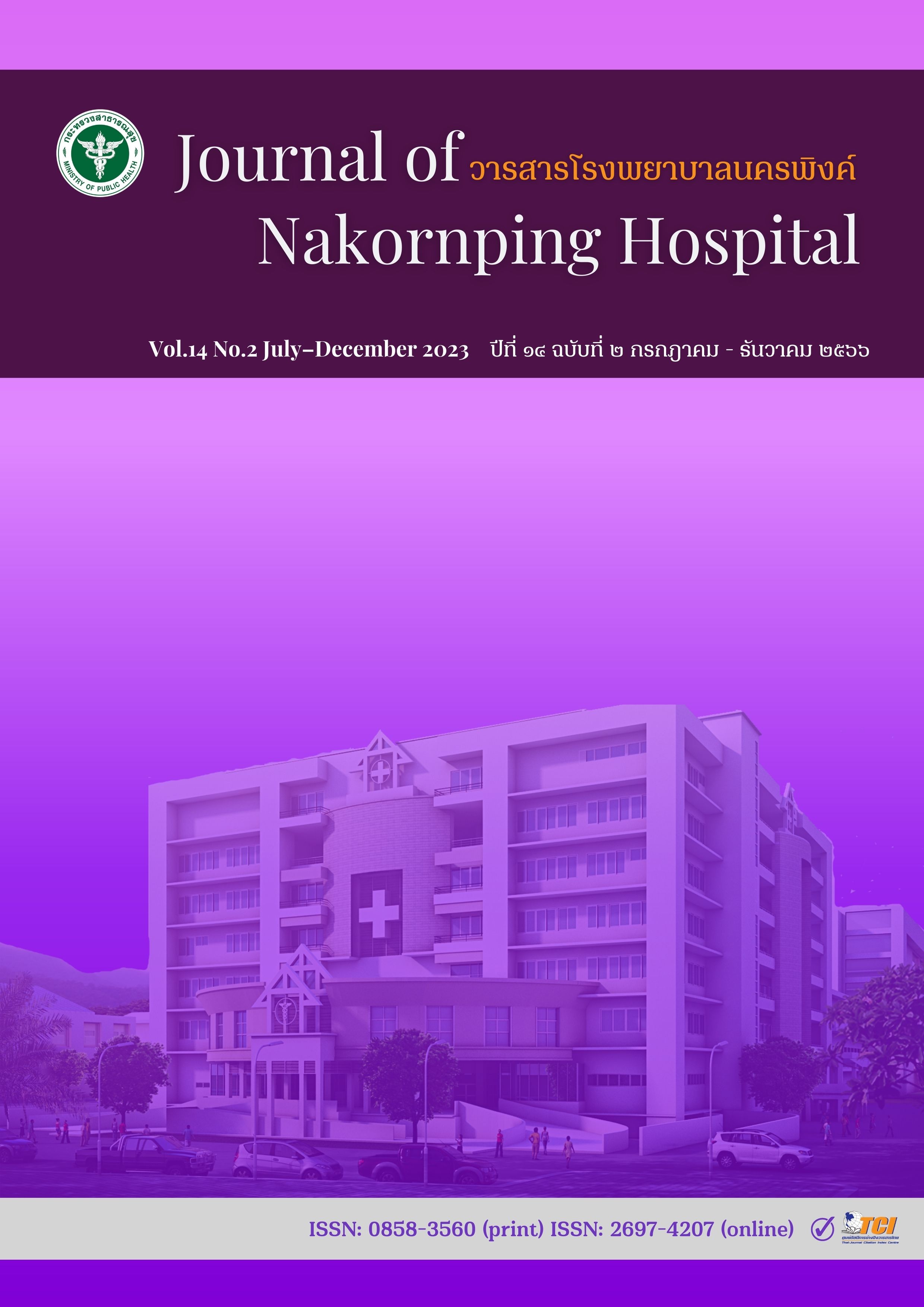Prediction score for in-hospital mortality among patients with necrotizing fasciitis: derivation and internal validation
Keywords:
Necrotizing fasciitis, risk score, in-hospital mortality, risk factorAbstract
Background: Necrotizing fasciitis (NF) is a rapidly progressive, life-threatening skin and soft tissue infection. Currently, a risk score tool to predict in-hospital mortality in NF patients is not warranted.
Objective: This study aimed to develop a tool to predict in-hospital mortality in NF patients.
Material and Methods: A retrospective study was conducted during January 2019 to December 2020. The hospital records of 293 NF patients were reviewed. Data including age, sex, location of lesion, laboratory results, comorbidity, pathogen organism, and in-hospital mortality were collected. Multivariable binary regression with backward stepwise elimination was used to identify a set of prognostic factors, whose regression coefficients were weighed, assigned, and summed to a total risk score. Finally, three risk groups—low, moderate, and high—for in-hospital mortality in NF patients were classified.
Results: A cohort of 293 patients diagnosed with NF was investigated, among whom 25 cases, accounting for 8.4% of in-hospital mortality. Four prognostic factors significantly associated with predicting in-hospital mortality were identified: diabetes mellitus (Adj. RR 3.18, 95% CI 1.05-9.68), cirrhosis (Adj. RR 7.40, 95% CI 4.18-13.09), leukocytosis exceeding 20,000/uL (Adj. RR 2.61, 95% CI 2.13-3.20), and blood lactate levels (Adj. RR 1.12, 95% CI 1.09-1.15). These factors exhibited the prediction for in-hospital mortality up to 91.3% (AuROC 91.3%, 95% CI 82.5-100.0). The Likelihood Ratio of a positive result for the low-risk (<5 points), moderate-risk (5-8 points), and high-risk (>8 points) groups were 0.18 (95% CI 0.05-0.67, p <0.001), 0.86 (95% CI 0.34-2.17, p=0.744), and 9.06 (95% CI 3.88-21.14, p <0.001), respectively.
Conclusion: The developed risk scoring system in this study, consisting of four prognostic factors, demonstrates a high feasibility in assessing the ability to discriminate and predict mortality in NF patients. However, further validation of this tool should be conducted in tertiary and subsequent healthcare settings to ensure its accuracy and applicability.
References
Bair MJ, Chi H, Wang WS, Hsiao YC, Chiang RA, Chang KY. Necrotizing fasciitis in southeast Taiwan: clinical features, microbiology, and prognosis. Int J Infect Dis. 2009;13(2):255-260. doi:10.1016/j.ijid.2008.04.015
Anaya DA, McMahon K, Nathens AB, Sullivan SR, Foy H, Bulger E. Predictors of mortality and limb loss in necrotizing soft tissue infections. Arch Surg. 2005;140(2):151-158. doi:10.1001/archsurg.140.2.151
Wong CH, Wang YS. The diagnosis of necrotizing fasciitis. Curr Opin Infect Dis. 2005;18(2):101-106. doi:10.1097/01.qco.0000160896.74492.ea
Elliott DC, Kufera JA, Myers RA. Necrotizing soft tissue infections. Risk factors for mortality and strategies for management. Ann Surg. 1996;224(5):672-683. doi:10.1097/00000658-199611000-00011
Mulla ZD, Gibbs SG, Aronoff DM. Correlates of length of stay, cost of care, and mortality among patients hospitalized for necrotizing fasciitis. Epidemiol Infect. 2007;135(5):868-876. doi:10.1017/S0950268806007448
Chen IC, Li WC, Hong YC, Shie SS, Fann WC, Hsiao CT. The microbiological profile and presence of bloodstream infection influence mortality rates in necrotizing fasciitis. Crit Care. 2011;15(3):R152. doi:10.1186/cc10278
Huang KF, Hung MH, Lin YS, Lu CL, Liu C, Chen CC, et al. Independent predictors of mortality for necrotizing fasciitis: a retrospective analysis in a single institution. J Trauma. 2011;71(2):467-73; discussion 473. doi: 10.1097/TA.0b013e318220d7fa.
Kaul R, McGeer A, Low DE, Green K, Schwartz B. Population-based surveillance for group A streptococcal necrotizing fasciitis: Clinical features, prognostic indicators, and microbiologic analysis of seventy-seven cases. Ontario Group A Streptococcal Study. Am J Med. 1997;103(1):18-24. doi:10.1016/s0002-9343(97)00160-5
Salvador VB, San Juan MD, Salisi JA, Consunji RJ. Clinical and microbiological spectrum of necrotizing fasciitis in surgical patients at a Philippine university medical centre. Asian J Surg. 2010;33(1):51-58. doi:10.1016/S1015-9584(10)60009-7
Ruiz-Tovar J, Córdoba L, Devesa JM. Prognostic factors in Fournier gangrene. Asian J Surg. 2012;35(1):37-41. doi:10.1016/j.asjsur.2012.04.006
Hsiao CT, Weng HH, Yuan YD, Chen CT, Chen IC. Predictors of mortality in patients with necrotizing fasciitis. Am J Emerg Med. 2008;26(2):170-175. doi:10.1016/j.ajem.2007.04.023
Dworkin MS, Westercamp MD, Park L, McIntyre A. The epidemiology of necrotizing fasciitis including factors associated with death and amputation. Epidemiol Infect. 2009;137(11):1609-1614. doi:10.1017/S0950268809002532
Oncul O, Erenoglu C, Top C, Küçükardali Y, Karabudak O, Kurt Y, et al. Necrotizing fasciitis: A life-threatening clinical disorder in uncontrolled type 2 diabetic patients. Diabetes Res Clin Pract. 2008;80(2):218-23. doi: 10.1016/j.diabres.2007.12.001.
Foreman MG, Mannino DM, Moss M. Cirrhosis as a risk factor for sepsis and death: analysis of the National Hospital Discharge Survey. Chest. 2003;124(3):1016-20. doi: 10.1378/chest.124.3.1016.
Cheng NC, Tai HC, Tang YB, Chang SC, Wang JT. Necrotising fasciitis: clinical features in patients with liver cirrhosis. Br J Plast Surg. 2005;58(5):702-7. doi: 10.1016/j.bjps.2005.01.019.
Hu B, Ji W, Bo L, Bian J. How to improve the care of septic patients following "Surviving Sepsis Campaign: International Guidelines for Management of Sepsis and Septic Shock 2021"?. J Intensive Med. 2022;3(2):144-146. doi: 10.1016/j.jointm.2022.08.001.
Downloads
Published
How to Cite
Issue
Section
License
Copyright (c) 2023 Nakornping Hospital

This work is licensed under a Creative Commons Attribution-NonCommercial-NoDerivatives 4.0 International License.
The articles that had been published in the journal is copyright of Journal of Nakornping hospital, Chiang Mai.
Contents and comments in the articles in Journal of Nakornping hospital are at owner’s responsibilities that editor team may not totally agree with.



